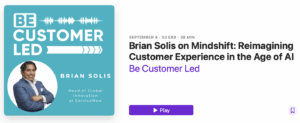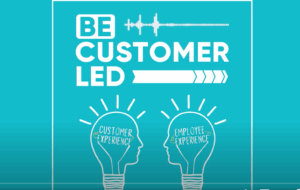
Credit: @Photo
Written by Martechvibe staff based on Brian Solis’ presentation at Brand Innovators CES on “11 Digital Trends Shaping CX and Marketing in 2020” which can be found on SlideShare. Presentation embedded below…
Times, tastes and trends always change. We live in an era of digital Darwinism, the evolution of technology and markets and its impact on norms and behaviours. To better compete, we need to see the world through the eyes of the customer. This is why I believe that when we discuss “customer experience” as an imperative, we should shift perspective, add “’s” and explore solutions and innovation from the “customer’s experience.”
The Emotional Cost
Customers live an incredibly demanding online life in addition to every other aspect of their day-to-day activities. Without even realising it, people feel increased pressure to keep up, to consume and to share content. They unwittingly compare themselves to everything and everyone. The cognitive load of trying to balance everything creates undiagnosed anxiety and stress. Now add to this all of the polarisations in social media and the exhausting news cycles fighting for our attention and emotion. This is the pervasive mindset, and the feeling customers bring to decision-making, and it affects their sentiment and the resulting experience and journey.
Truth
We live in a “post-truth” era, yet the truth is what we all need to feel safe and directed. The trust economy is upon us once again. Customer truth requires every brand to become a data-centric (and human) organisation. Execution must be personal and value-added and mind the “creepy” line. Customers need to feel their truth in every way you engage them. Ironically, AI can humanise engagement beyond simply automating it. This is a time to be human, even if through technology.
Every company must become an empathetic, human-centred data company. CX and marketing innovation must prioritise cross-functional, organisational collaboration. Without doing so, assembling the pieces that from 360 customer truth will be incomplete and elusive.
I share the trends (and hopes) I would love brand executives to embrace in the new year
Trend 1: The role of search is more important than ever before
Position Zero in search is a new Holy Grail, but it isn’t the only window to discoverability. The key is to be discoverable via targeted contexts and platforms…then guide a personalised journey to their desired next-based action. Think voice (Google Home, Alexa), AR (Google Lens), Amazon, and Youtube.
Trend 2: Ignite Moments become the “embrace” in important touchpoints and moments of truth
An immediate opportunity exists for marketers to become the light that customers crave. Marketers that create a productive and gratifying customer journey, one that prioritises customer truth and positive engagement, will build trust and meaningful long-term relationships. #IgniteMoment
Trend 3: Native UX and UI and customer journeys are now mission-critical in customer experience
Next-generation CX must be designed as native experiences for emerging voice, mixed reality and 5G platforms. The future is about discoverability. You have to be present in ways that are relevant to customer moments, intentions and devices. That’s the context for engagement. From there, dedicated and personalised experiences, how you talk, what you show, what you say, become the differentiation that sets you apart. But if you don’t show up the right way, at the right time, on the right device, then you’re by default out of contention in the customer journey. Without discoverability, whether that’s text, voice or visual, there can be no consideration.
Trend 4: 5G offers a new canvas for experience design and analytics
5G unlocks new opportunities to design richer, more immersive and personalised customer experiences. On the back end, 5G also transmits more data than marketers are prepared to analyse and execute against.
Trend 5: AI and machine learning offer ability to prioritise “humanisation”
AI and machine learning can identify patterns in customer behaviours to power real-time and even predictive analytics, but when pointed in the right direction, we can start to recognise patterns of humanity and aspirations to deliver more meaning.
Trend 6: The future of connected TV marketing/advertising is unwritten
The future of TV advertising is an entirely new ecosystem of planning, buying, distribution, performance/ influence and measurement. Desired households and audiences can be specifically targeted. Ad creative and placements are data-driven, to be more effective in connecting with distracted audiences in new formats.
Trend 7: Location intelligence unlocks geospatial data to empower understanding, insight, decision-making, and prediction
This is next-level, real-time customer experience. LI add layers of data, including demographics, traffic, and weather patterns to make sense of location behaviour to then predict and optimise physical experiences, i.e. events, travel, hospitality, retail.
Trend 8: AI empathy + ethics takes a front and centre role in marketing/CX
Innovation, Empathy and AI Ethics become the differentiators for #DDNs (Data-Driven Networks). Prioritise human experiences.
Use clean data, shift from legacy biases and embrace a growth mindset will lead to personalised and innovative experiences and more accurately predict what’s next.
Trend 9: Brands will take a stand on ambient advertising in social media and gaming
Programmatic advertising is placing brands in toxic and unsafe (but popular) environments that affect user experiences (especially youth). Brands are “guilty by association” just by being present. Brands must align together to convince platforms to employ AI-driven moderation to protect the community and brand experience.
Trend 10: Shift from growth and vanity metrics to CLV
Prioritising retention, loyalty and advocacy help brands measure what matters to customers.
These efforts become pillars for the BRAND EXPERIENCE. Growth and CLV are outcomes.
Trend 11: Experience style guides will complement brand style guides
Customer experience needs a style guide to serve as the standard for excellence, sentiment and outcomes, i.e. “the experience” in each touchpoint and throughout the journey.
Experience innovation is a differentiator. When innovation succeeds, customers win.
There are certainly more than 11 trends to follow, but in the context of this conversation, I focused on the convergence of AI, customer empathy, digital distractions and intentions, and the technology that connects the dots to native, end-to-end experiences.

Brian Solis | Author, Keynote Speaker, Futurist
Brian Solis is world-renowned digital analyst, anthropologist and futurist. He is also a sought-after keynote speaker and an 8x best-selling author. In his new book, Lifescale: How to live a more creative, productive and happy life, Brian tackles the struggles of living in a world rife with constant digital distractions. His previous books, X: The Experience When Business Meets Design and What’s the Future of Business explore the future of customer and user experience design and modernizing customer engagement in the four moments of truth.
Invite him to speak at your next event or bring him in to your organization to inspire colleagues, executives and boards of directors.





Leave a Reply